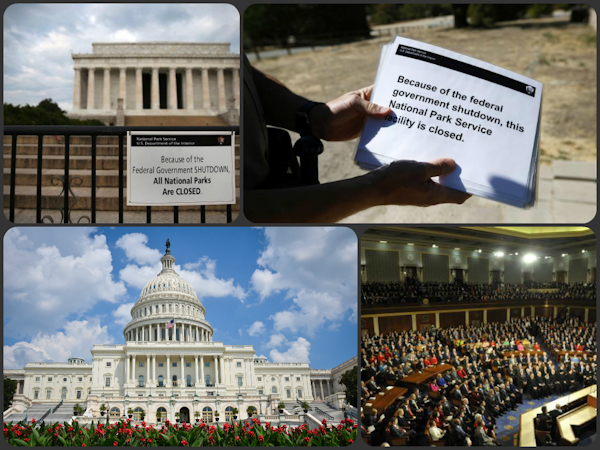Photo by: Will Gentry
The bill used to end the shutdown passed with a vote of 81-18 in the U.S. Senate and a vote of 285-144 in the U.S. House of Representatives.
The bill, written by Sens. Reid and McConnel, will fund the government until Jan. 15, and raise the debt ceiling until Feb. 7. There will also be a formal budget conference in an attempt to reach a longer-term deal by Dec. 13.
President Barack Obama addressed the nation in a press conference the night the bill was signed.
“Over the past four years, our economy has been growing, our businesses have been creating jobs and our deficits have been cut in half,” Obama said. “But nothing has done more to undermine our economy these past three years than the kind of tactics that create these manufactured crises.”
Oklahoma Christian University Associate Professor of Political Science Raymon Huston cleared up some of the messier dealings about the government shutdown.
“The closest thing to good [about the shutdown] is that the Republicans – mostly Tea Partiers – got to voice their opinion in a public forum to object to the Affordable Care Act and to balance the budget,” Huston said. “The bad part of the shutdown – there are many things here – the first thing was that people were laid off and removed a lot of money out of circulation because people were not being paid. They are going to get back pay now, which means there is going to be an influx of money in circulation. You may be thinking, ‘How is that going to be a bad thing?’ Well if you have an influx of that much money shoved into the economy that fast, it is going to cause increased inflation in the United States.”
Students at Oklahoma Christian held varying views on the government shutdown. A few students believe the shutdown may have had a few positive points.
“In the short term, the government shutdown was a bad thing,” senior Johnathon Gause said. “It put a halt to a lot of programs that the government provides that are necessary in the long run to keep the government running as it currently does. For long term it could potentially be a good thing in that [the government shutdown] is something we could look back on and say we don’t want to do that again.”
According to an estimate from the Standard and Poor’s financial company, the government shutdown cost $24 billion. According to the U.S. Travel Association, $152 million was lost per day on travel spending and the National Park Service lost $76 million per day due to park closures.
“These twin threats to our economy have been lifted,” Obama said. “There are no winners here. These last few weeks have inflicted completely unnecessary damage on our economy.”
The Republicans were not able to achieve their goal of delaying or defunding the Affordable Care Act and ended up taking most of the blame for the government shutdown. According to NBC, the Republicans are “bruised by historically low approval ratings and plagued by infighting.”
“This has been a long, challenging few weeks,” Mitch McConnell, the Republican minority leader said in an article by The Guardian. “This is far less than many of us had hoped for, but it is far better than some had sought.”
Obama mentioned the financial damage the shutdown caused, as well as the change in perspective of America from other countries.
“Probably nothing has done more damage to America’s credibility in the world, our standing with other countries, than the spectacle we have seen these past several weeks,” Obama said.
Obama began talking about the future and called for the House of Representatives to pass three bills that are waiting to be voted on.
“Let me be specific about three places we can make progress right now,” Obama said. “Passing a budget; immigration reform; farm bill: Those are three specific things that would make a huge difference in our economy right now and we could get them done by the end of the year.”
According to a recent Gallup poll, 60 percent of Americans would like to have a third political party start up. Some students at Oklahoma Christian see problems with a third party.
“The third party system would not work until the 50 percent majority vote that is required to pass a bill is removed,” senior John Wood said.
Other students differ in opinion on the application of a third party.
“I don’t know if it would be useful in this situation but it wouldn’t hurt,” Gause said. “There are enough moderate Democrats and Republicans on each side to come to agreements, but a third party would help the constant deadlock between the parties as a whole.”
To voice opinion and let a representative understand the frustration, there are a few options such as email or phone calls, but Huston supports a more active approach.
“I’m a firm believer in protest,” Huston said. “If you truly believe in something, you go out and do something about it. Get out of your comfort zone and get out there and make the representative lie to your face instead of over the phone or through email.”












Be First to Comment